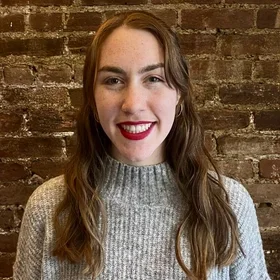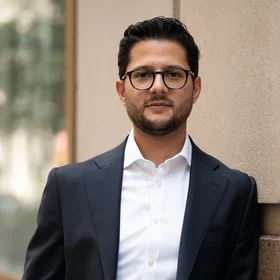“Our nation and world are facing significant challenges,” says Captain Treven Treece, a West Point officer who is currently earning his M.S. in Negotiation and Conflict Resolution (NECR) at Columbia’s School of Professional Studies (SPS) alongside fellow West Point officer Major Theodore De Leeuw.
“Some of those issues have existed for generations. The things I am learning now will help me with many of my professional and personal goals, which includes working with local and global communities to help bring peace and reconciliation.”
The two officers recently met with U.S. Army veteran and NECR graduate La-Verna Fountain ('10SPS) to discuss the skills they are gaining to help facilitate constructive dialogues across local and global communities, the importance of the relationship between SPS and West Point, and how the NECR program is expanding their ability to “listen, learn, and lead.”
What inspires you to serve?
Major De Leeuw: I was still in junior high school when our nation was attacked on 9/11. Prior to that day, I knew I wanted to positively contribute to society, but I wasn't thinking big. On that fateful day, my vision became more focused.
My father was enlisted in the Army during Vietnam. He and I talked about service, and he told me if I wanted to join the Army, I should do it as an officer. Today, I am a major serving and working on my second master’s degree thanks in part to his advice and the encouragement from some of my colleagues at West Point. I have a wonderful wife and have been blessed with two precious young children. After serving in Afghanistan, I am committed to doing all I can for them and other children.
Captain Treece: I am grounded by the values instilled in me by my mother and supported by my wife. They both encompass a spirit of education and service. I am proud of their belief in me. I am also grateful for Major De Leeuw. We talk about what we are learning here and how it applies to our work and oath as military officers.
What made you choose Columbia University’s Negotiation and Conflict Resolution (NECR) program?
Major De Leeuw: Captain Treece and I were chosen to participate in this partnership between West Point and Columbia’s School of Professional Studies. My mentor at West Point took several foundational courses in the NECR program, and he worked with some of Columbia’s leaders to help create this partnership. It offers us an opportunity to learn practical and theoretical skills from some of the world’s best, and we get to be in an academic setting made up of people from around the world. Columbia has global faculty experts, and students in my class represent a diverse global community. Some students represent areas where there have been or currently are intractable conflicts. Their perspectives are invaluable.
Captain Treece: I am fortunate to be married to a West Point graduate, Captain Dajah Treece, who encouraged me to come to West Point. We have an amazing six-month-old son. I currently attend Columbia's School of Professional Studies and will become an instructor with West Point staff and cadets upon graduation. Here at Columbia, I am already learning from others, and we just started in September. Once this program was recommended, it only made sense for me to take advantage of the opportunity.
The world seems to be experiencing an increase in divisive language and polarization. What has been your greatest “aha moment” since starting the NECR program?
Major De Leeuw: It is not so much an “aha” as it is an observation. Dynamical Systems Theory has already expanded the way I see and hear about conflict. I believe we all need to do more listening. I firmly believe effective leaders are effective listeners. We don’t know what we don’t know, and we must listen not to respond but to learn. I know I can’t control things outside my own sphere of influence, but I can spend this time focusing on improving my ability to listen, learn, and lead.
Captain Treece: I look forward to learning more from the faculty and the students. I think my big lesson thus far is how little we truly know about the struggles of others. I love working with different cultures. By watching and listening, you learn a great deal. At the end of the day, we might disagree, but at least we can understand each other more, and in doing so, maybe we can find better ways to live together.
What advice would offer to any veteran considering coming to Columbia, and what would you say to anyone interested in decreasing violence?
Major De Leeuw: I hesitate to offer advice. I serve because it is part of who I am. I am in the military, and soon to be at West Point, because I get to serve and lead by example. The partnership between Columbia and West Point provides an opportunity to help create a brighter future for others. Here at Columbia, I hope more opportunities are created for diverse groups to come together in ways that allow people—students, faculty, and administrators—to see beyond surface differences and connect as human beings with hopes, aspirations, fears, and generational experiences.
As an officer in the U.S. military, I view my opportunities and challenges through my military lens. Thanks to what I am learning here, I can add negotiation, mediation, and other conflict resolution tools and techniques to the tool kit, which I hope can be used anywhere and at any time. I think anyone, in the military or not, can benefit from those tools.
Captain Treece: Keep listening even when it is difficult, and keep learning even when it requires you to prioritize differently than you were used to.
Don’t turn away from opportunity. Reach high and grow. Maintain a support system—at Columbia, there is a support network for veterans—and learn conflict resolution skills. I believe that both Columbia University and West Point offer the kind of intensive, in-depth training we all need.
About the Program
Columbia University’s Master of Science in Negotiation and Conflict Resolution prepares students to analyze the root causes and dynamics of conflict and to transform disputes through reasoned and resourceful interventions. The program focuses on developing self-awareness, tenacity, and interpersonal competency; building common ground; opening lines of communication; ensuring representation and recognition; and building sustainable possibilities for resolution.


